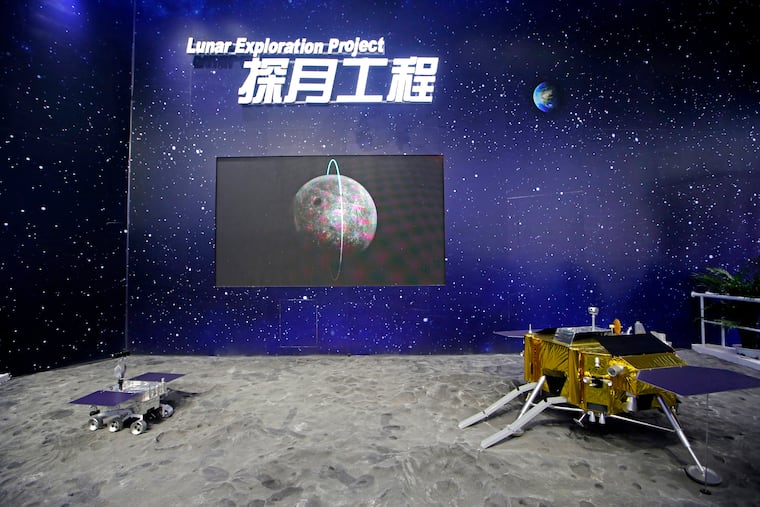From Munich Security Conference: Security threats move to cyberspace and outer space | Trudy Rubin
Welcome to a brave new world.

MUNICH, Germany — The biggest security threats to America in the near future will have nothing to do with migrant caravans or terrorists or clashes with enemy troops.
At this year’s Munich Security Conference, an annual meeting of global leaders and international security officials, the focus was more on threats from new technologies than on conventional warfare or jihadis. Russia is already waging cyberwar on U.S. and European elections, while the United States is already engaged in a tech war with China over who will dominate 5G (fifth-generation) computer networks.
But listening to panels with titles like “The Coming Role of Artificial Intelligence in Global Affairs” and “Cyber Risks and the Financial System” was a reminder: We are on the cusp of technological changes that will shake global security in the near term. Changes that will play out not only on earth, but in space – and in earthly regions that were previously impervious to political clashes, such as the Arctic.
And changes about which most Americans have little awareness. “The intersection of geopolitics and technology is not sufficiently understood,” said Ian Bremmer, president of the Eurasia Group, at a Munich “Fireside Chat on Geopolitics and Technology in 2019.″
So here are a few impressions from the conference on the impact of technology on security in 2019 and beyond.
The soaring impact of technology on relations between the West, China, and Russia
As Bremmer noted, a declining Russia (with population falling and oil prices lower) is “using asymmetric capability to go after the West” with information warfare. Such cyberattacks are likely to continue, and become even more dangerous as technological gains make it easier to produce fake videos that look like the real thing.
Added Microsoft president Brad Smith: “Disinformation efforts require coordinated, multilateral response, which is harder to summon.” Especially in the era of America First.
Meantime, civilian systems such as electricity and communications are vulnerable to attack. Toomas Hendrik Ilves, former president of Estonia, recalled that “in 2007 we suffered a complete cyberattack.” His country’s banks, media, and government bodies were taken down by a massive cyber assault from Russian IP addresses. “We still do not have a combined approach in the West to cyberthreats,” he complained. “We don’t share information. We need to start moving.”
At the same time, we have approached the tipping point between China and the United States in their tech battle over who will dominate 5G networks. The Trump administration is pressing its allies to ban Huawei, China’s leading telecommunications producer, from building the infrastructure for its next-generation computer and phone networks from fear the Chinese military will use these systems to collect masses of sensitive data. (Huawei claims its systems have no secret governmental back door, but in China the line between private companies and the government is totally blurred.)
While China pours massive money and resources into the technology race, pushing to outstrip America in the realm of artificial intelligence, the parallel response from the White House has been mainly rhetorical. Microsoft’s Smith believes we should treat the tech race with China “as a Sputnik moment,” similar to the response to the Soviet space advances of the 1950s. But, as he points out, Washington responded to Sputnik by passing the National Defense Education Act and channeling enormous resources into education and research. No similar response is likely now.
The technological race in space
“Space is back,” noted a speaker at a panel titled “From Cold War to Star Wars: How to Deal With the Arms Race to Space?” After years of fantasies about space wars, we may be on the verge of the real thing.
“Star Wars is a movie, but we face a new era in which we are very dependent on space,” warned Gen. Michel Friedling, commander of the French Joint Space Command. “We are so dependent today on space for military operations. If we lose control of space assets, we would lose the war on the ground, air, and sea.”
“There is conflict already in space,” said Renata Dwan, director of the Institute for Disarmament Research at the United Nations. “There are low-level hackers and terrorists who have the capability. Space has reentered our imagination. And there is the risk of competition by great powers."
Added Friedling, “Last year for the first time China was first in launches, has around 200 satellites in space, with military application and more than 50 percent launched in the last five years.” (China landed on the far side of the moon this year.)
With 18 countries present in space, according to Dwan, and up to 60 commercial actors, “space is becoming more competitive. We need to think what we need for rules of the road.” The threat of cyberwar in space affects every aspect of our civilian lives and security.
Indeed, if there was one overriding message about the new risks posed by technological advances, it was the need for a cooperative approach by Western powers to unify responses to cyber threats from aggressive nations, hackers, or terrorists. And yet, as Estonia’s Ilves pointed out, “We are seeing every country go its own way.” And no leadership is forthcoming from Washington.
So the threat of techno-risks and techno-wars was the talk of Munich. Welcome to a brave new world.